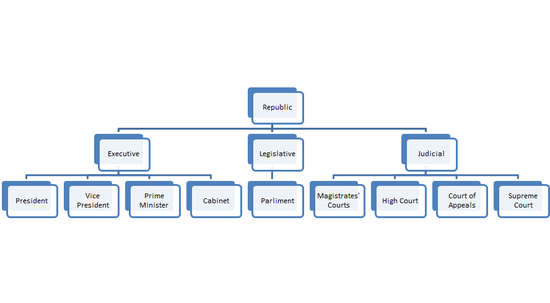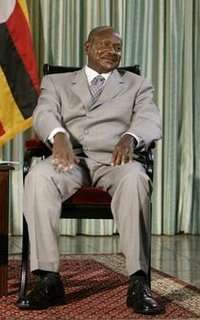Politics of Uganda
 |
| This article is part of a series on the politics and government of Uganda |
|
Judiciary |
|
| Foreign relations |
|
Politics portal |
Uganda is a presidential republic, in which the President of Uganda is both head of state and head of government. There is a multi-party system. Executive power is exercised by the government.
Legislative power is vested in both the government and the National Assembly. The system is based on a democratic parliamentary system with universal suffrage for all citizens over 18 of years age.
Political culture
In a measure ostensibly designed to reduce sectarian violence, political parties were restricted in their activities from 1986. In the non-party "Movement" system instituted by the current president Yoweri Museveni, political parties continued to exist but could not campaign in elections or field candidates directly (although electoral candidates could belong to political parties). A constitutional referendum cancelled this 19-year ban on multi-party politics in July 2005.
The presidential elections were held in February 2006. Museveni ran against several candidates, of whom the most prominent was the exiled Dr. Kizza Besigye. Museveni was declared the winner. Besigye alleged fraud, and rejected the result. The Supreme Court of Uganda ruled that the election was marred by intimidation, violence, voter disenfranchisement, and other irregularities. However, the Court voted 4-3 to uphold the results of the election.[1]
Executive

| Office | Name | Party | Since |
|---|---|---|---|
| President | Yoweri Museveni | National Resistance Movement | 26 January 1986 |
| Prime Minister | Ruhakana Rugunda | National Resistance Movement | 18 September 2014 |
The head of state in Uganda is the President, who is elected by a popular vote to a five-year term. This is currently Yoweri Museveni, who is also the head of the armed forces. The previous presidential elections were in February 2006 and in the election of February 2011 Museveni was elected with 68% of the vote. The cabinet is appointed by the president from among the elected legislators. The prime minister, currently Ruhakana Rugunda, assists the president in the supervision of the cabinet.
The Cabinet of Uganda, according to the Constitution of Uganda, "shall consist of the President, the Vice President and such number of Ministers as may appear to the President to be reasonably necessary for the efficient running of the State."[2][3]
Ministries of Uganda
- Ministry of Foreign Affairs
- Ministry of Justice & Constitutional Affairs
- Ministry of Public Service
- Ministry of Finance, Planning, and Economic Development[5]
- Ministry of Education and Sports
- Ministry of Local Government
- Ministry of Health
- Ministry of Works and Transport
- Ministry of Lands, Housing & Urban Development
- Ministry of Internal Affairs
- Ministry of Water and Environment
- Ministry of Gender, Labour & Social Development
- Ministry of Energy and Minerals
- Ministry of Defense
- Ministry of Agriculture, Animal Industry and Fisheries
- Ministry of Information & Communication Technology
- Office of the Prime Minister (OPM) - Department of Relief, Disaster Preparedness and Management
- Office of the Prime Minister (OPM) - Department of Information and National Guidance
- Ministry of Trade, Industry and Cooperatives
Political parties and elections
On 4 May 2005, the Ugandan Parliament voted to conduct a referendum on the reintroduction of party politics in Uganda. The referendum was held on July 28, 2005 and Ugandans voted for a return to multi-party politics.
| Candidates - nominating parties | Votes | % |
|---|---|---|
| Yoweri Museveni - National Resistance Movement | 4,109,449 | 59.26 |
| Kizza Besigye - Forum for Democratic Change | 2,592,954 | 37.39 |
| John Ssebaana Kizito - Democratic Party | 109,583 | 1.58 |
| Abed Bwanika - Independent | 65,874 | 0.95 |
| Miria Obote - Uganda People's Congress | 57,071 | 0.82 |
| Total | 6,934,931 | 100.00 |
| Source: New Vision newspaper, Electoral Commission of Uganda | ||
| Parties | Votes | % | Constituency seats |
District woman reps. |
Indirect seats |
Total seats |
|---|---|---|---|---|---|---|
| National Resistance Movement | 142 | 49 | 14 | 205 | ||
| Forum for Democratic Change | 27 | 10 | - | 37 | ||
| Uganda People's Congress | 9 | - | - | 9 | ||
| Democratic Party | 8 | - | - | 8 | ||
| Conservative Party | 1 | - | - | 1 | ||
| Justice Forum | 1 | - | - | 1 | ||
| Independents | 26 | 10 | 1 | 37 | ||
| Vacant | 1 | - | - | 1 | ||
| Uganda People's Defence Force Representatives | 10 | |||||
| Ex-officio members | 10 | |||||
| Total (turnout 72 %) | 215 | 69 | 15 | 319 | ||
| Source: Inter-Parliamentary Union | ||||||
|
Note on the Distribution of seats: | ||||||
Judiciary
The Ugandan judiciary operates as an independent branch of government and consists of magistrate's courts, high courts, courts of appeal (which organizes itself as the Constitutional Court of Uganda when hearing constitutional issues), and the Supreme Court. Judges for the High Court are appointed by the president; Judges for the Court of Appeal are appointed by the president and approved by the legislature.
Foreign relations
A fight between Ugandan and Libyan presidential guards sparked chaos during a ceremony attended by the heads of state from 11 African nations on March 19, 2008.[6]
International organization participation
- ACP (Lomé Convention)
- African Development Bank
- Commonwealth of Nations
- East African Development Bank
- Food and Agriculture Organization
- Group of 77
- Intelsat
- Intergovernmental Authority on Development
- International Atomic Energy Agency
- International Bank for Reconstruction and Development
- International Civil Aviation Organization
- International Confederation of Free Trade Unions
- International Criminal Court
- International Development Association
- International Finance Corporation
- International Fund for Agricultural Development
- International Labour Organization
- International Monetary Fund
- International Red Cross and Red Crescent Movement
- International Olympic Committee
- International Organization for Migration
- International Organization for Standardization (correspondent)
- International Telecommunication Union
- Interpol
- Islamic Development Bank
- Non-Aligned Movement
- Organisation for the Prohibition of Chemical Weapons
- Organisation of African Unity
- Organisation of Islamic Cooperation
- Permanent Court of Arbitration
- United Nations
- United Nations Conference on Trade and Development
- United Nations Economic Commission for Africa
- United Nations Educational, Scientific and Cultural Organization
- United Nations High Commissioner for Refugees
- United Nations Industrial Development Organization
- Universal Postal Union
- World Customs Organization
- World Federation of Trade Unions
- World Health Organization
- World Intellectual Property Organization
- World Meteorological Organization
- World Tourism Organization
- World Trade Organization
See also
- List of government ministries of Uganda
- Cabinet of Uganda
- Parliament of Uganda
- Supreme Court of Uganda
References
- ↑ "Uganda's Museveni wins election", BBC, 25 February 2006
- ↑ 1995 Constitution of Uganda (see page 83 of 192)
- ↑ 2005 amended Constitution of Uganda (see page 100 of 231)
- ↑ http://mtic.go.ug/index.php?/ministries-in-uganda/
- ↑ http://www.finance.go.ug
- ↑ http://edition.cnn.com/2008/WORLD/africa/03/20/uganda.libya/index.html
- Uganda's opposition join forces (BBC News, 16 February 2004)
- "Uganda 'night commuters' flee rebel brutality" (Yahoo News, October 17, 2005)
- Tripp, Aili Mari, Museveni’s Uganda: Paradoxes of Power in a Hybrid Regime, Lynne Rienner Publishers, 2010.
External links
- Parliament of Uganda
- State House of Uganda
- Constitution of the Republic of Uganda
- Party Politics in Uganda, 1963-2000, Christina Nyströmee
- Uganda Government at DMOZ
| |||||||||||||||||||||||||||||||||||||||||
| ||||||||||||||
